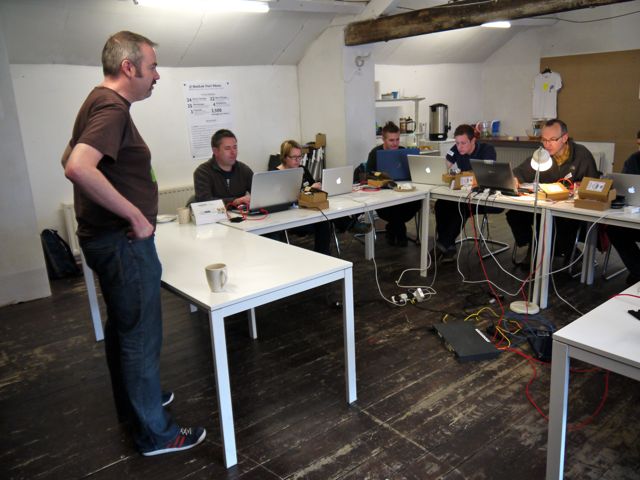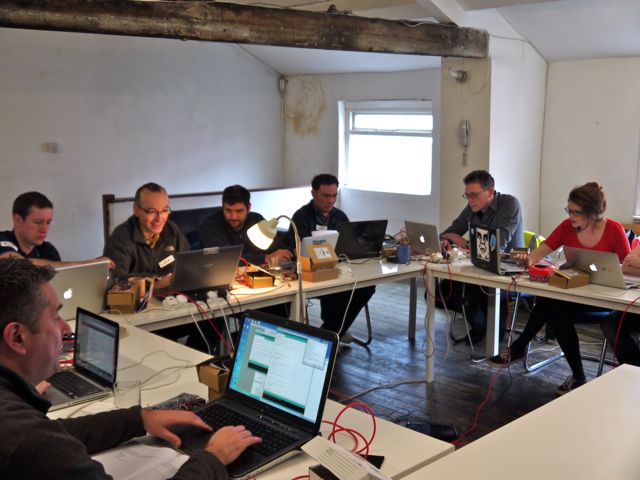Building the Internet of Things at MadLab

On Saturday 31st March, I went with Adrian to MadLab in Manchester, to sit in on one of Adrian’s courses in Arduino and Ethernet organized by the Omniversity of Manchester, a series of professional courses, mostly in digital and arts themes.
This arduino course evidently appealed to both ends of that spectrum as the 10 participants included programmers and physicists, but also artists, photographers, and design students.
MadLab, as a community venue, is very much substance over style. Sure, there’s no swanky designer furniture, but there’s a solid, well laid out space, and whenever anyone needed anything — ethernet cables, a router, a lamp, a USB hub — Hwa Young and her team got hold of them straight away. The course is surprisingly affordable (I’d say almost insanely so, given that the £130 fee included a goodie bag of the electronics needed to play along, as well as an excellent lunch and snacks.)

For the first part of the day, Adrian gave a short introduction to the internet - ethernet, IP, and http. I think this was very clear, and quite useful, though it was probably a lot to take in if you weren’t already working in web. The rest of the day, the students were encouraged to work through half a dozen examples in a booklet that Adrian had put together with Hwa Young. This had several projects, like
-
switching on an LED in response to tweets (essentially the same idea as Bubblino or Uniform's Sweet Tweet.
-
writing a temperature feed to Pachube, or to twitter.
-
reading from a Pachube feed, and lighting an LED in different colours in response.
-
using the Arduino as a simple web-server
While starting out with electronics might seem a bit daunting, Arduino does seem to be very quick at giving you a working result. All the examples had working code provided, and after some initial hurdles, people worked through their first projects quite quickly, and moved onto the next.
That said, when you put together Arduino AND networking AND internet APIs AND laptops of various types, you’re going to have the odd teething problem, so the first thing was to make sure that all the laptops had wifi (one refused to connect), could share it with the arduinos via ethernet (Macbook Airs don’t have a port; different versions of Windows configure it slightly differently; the technique we found for OSX didn’t work on one laptop, etc.) Then you have serial port issues over USB (mostly on Windows, it seemed), clashing MAC and IP addresses (hardcoded into the code examples). Finally, there’s fun with APIs, such as Pachube’s highly flexible but confusing keys, or Twitter’s rate limits…
Phew! All of which is why you go to a course with an experienced tutor like Adrian, of course ;-) I was initially surprised that so much of the day was spent in a largely unstructured way, but I think it worked really well for the participants. They got to work at their own pace, with a really nicely designed set of examples and kit, and with expert support to hand when they needed it. When I popped out of the room for a minute I noticed a monastic hush when I came back in. It was even hard to drag them away from their desks for lunch.
If you’re interested in doing an Arduino course at MadLab, they are currently doing then at least twice a year, as there’s currently a lot of demand for them.